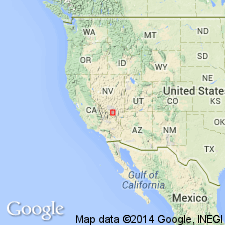
- Usage in publication:
-
- Timber Mountain Tuff*
- Modifications:
-
- Named
- Dominant lithology:
-
- Tuff
- AAPG geologic province:
-
- Great Basin province
Summary:
Named as the upper formation of the Piapi Canyon Group (formerly Piapi Canyon Formation of Oak Spring Group; named Oak Spring abandoned). Type locality is the Timber Mountain region, northwest-central edge of Nevada Test Site, Nye Co, NV in the Great Basin province. Is unconformable on Paintbrush Tuff (new) of Piapi Canyon Group. Is overlain by the basalt of Skull Mountain at Skull Mountain. Divided into (ascending): Rainier Mesa Member (formerly a member of Oak Spring Formation), tuff of Cat Canyon, tuff of Transvaal, and Ammonia Tanks Member (new). Nomenclature chart. Cross section. Rainier Mesa and Ammonia Tanks are nearly coextensive tuffs. Tuff of Cat Canyon is limited to Timber Mountain area where it consists of a lower composite ash-flow sheet as much as 2,850 ft thick and an upper compound ash-flow cooling unit 0-150 ft thick. The tuff of Transvaal is limited to Camp Transvaal southwest of Timber Mountain where it has a lower nonwelded rhyolitic ash-flow tuff 0-200 ft thick, and an upper compound cooling unit of rhyolitic ash-flow tuff as much as 300 ft thick. Has an age of 10.5 m.y. or Pliocene.
Source: GNU records (USGS DDS-6; Denver GNULEX).
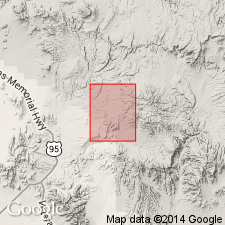
- Usage in publication:
-
- Timber Mountain Tuff*
- Modifications:
-
- Mapped
- AAPG geologic province:
-
- Great Basin province
Summary:
Mapped in Thirsty Canyon SE quad, Nye Co, NV. Includes (ascending); Rainier Mesa Member, tuff of Cat Canyon, tuff of Camp Transvaal, Ammonia Tanks Member. Individual members have separate parts or lithologies shown separately on map. Locally unconformably underlies tuff of Cutoff Road or trachyandesite lava.
Source: GNU records (USGS DDS-6; Menlo GNULEX).
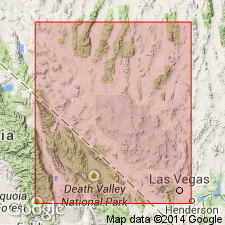
- Usage in publication:
-
- Timber Mountain Tuff*
- Modifications:
-
- Geochronologic dating
- AAPG geologic province:
-
- Great Basin province
Summary:
K-Ar determinations on biotite and sanidine from members of Timber Mountain Tuff range in age from 12.1 Ma to 10.4 Ma. Sketch map shows localities of samples.
Source: GNU records (USGS DDS-6; Menlo GNULEX).
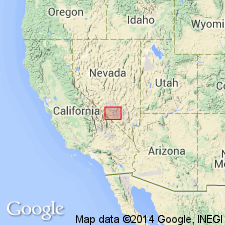
- Usage in publication:
-
- Timber Mountain Tuff*
- Modifications:
-
- Overview
- Revised
- AAPG geologic province:
-
- Great Basin province
Summary:
Revised to include all quartz-bearing tuffs and thin ash-fall tuffs erupted about 11 m.y. ago [Miocene] from Timber Mountain caldera in southern Nye Co, NV in the Great Basin province. Includes (ascending): Rainier Mesa Member, Ammonia Tanks Member, and the tuffs of Crooked Canyon and of Buttonhook Wash. Also includes thin sequences of unnamed bedded ashfall tuffs that are intercalated with the ash-flows. Quartz phenocrysts as much as 3 mm long are common to abundant in both ash-flow and associated thin ash-fall units. The Ammonia Tanks Member is restricted to the upper part of the Ammonia Tanks of earlier reports. Distribution maps of the two named members show them in NV as extending as far east as the southwest edge of Lincoln Co, northwest edge of Clark Co, and across southern Nye Co into easternmost Inyo Co, CA. Stratigraphic chart. Is younger than Paintbrush Tuff and older than some unnamed bedded tuffs. Modal analyses. Assigned a Pliocene age [isotopic date indicates Miocene age].
Source: GNU records (USGS DDS-6; Denver GNULEX).
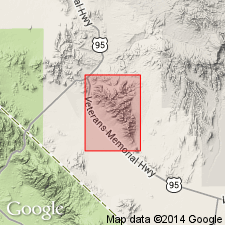
- Usage in publication:
-
- Timber Mountain Tuff*
- Modifications:
-
- Age modified
- AAPG geologic province:
-
- Great Basin province
Summary:
Age of Timber Mountain Tuff in report area [Bare Mountain, Nye Co, NV] revised from late Miocene to: middle Miocene based on radiometric ages ranging from approximately 15 to 12.8 Ma [1983 DNAG Geologic Time Scale = middle Miocene].
Source: GNU records (USGS DDS-6; Menlo GNULEX).
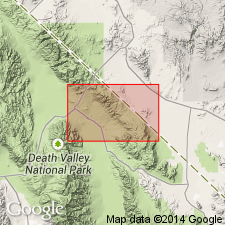
- Usage in publication:
-
- Timber Mountain Tuff*
- Modifications:
-
- Areal extent
- AAPG geologic province:
-
- Great Basin province
Summary:
Unit geographically extended into report area [hilly area adjacent to east flank of north Funeral Mountains, Inyo Co, CA] as an undivided unit. [Its Ammonia Tanks and Rainier Mesa Members are also separately mapped here.] Age given as Miocene.
Source: GNU records (USGS DDS-6; Menlo GNULEX).
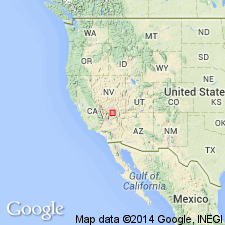
- Usage in publication:
-
- Timber Mountain Group*
- Modifications:
-
- Revised
- Geochronologic dating
- AAPG geologic province:
-
- Great Basin province
Summary:
Within southwest Nevada volcanic field, Nye Co, NV, Great Basin province, units previously of formation rank are raised to group rank to allow for combining petrographically, geochemically, and temporally related lava flows and nonwelded tuffs with the principal correlative welded ash-flow tuff sheets (formerly members of the previous formation-rank tuffs). The ash-flow sheets are raised to formation rank and designated as "Tuff." Timber Mountain consists of (ascending) Rainier Mesa and Ammonia Tanks Tuffs (rank raised for both units). [Timber Mountain also consists of informal units not discussed in this report.] Nomenclature shown on table 1. Overlies Paintbrush Group (rank raised); older than Beatty Wash Formation (new). [Though not addressed by authors, raising Timber Mountain and Paintbrush to group ranks necessitates raising Piapi Canyon Group to Piapi Canyon Supergroup.] 40Ar/39Ar dates on an average of 3 sanidine samples yielded ages of 11.6 +/-0.03 Ma for Rainier Mesa and 11.45 +/-0.03 Ma for Ammonia Tanks (Miocene).
Source: GNU records (USGS DDS-6; Denver GNULEX).
For more information, please contact Nancy Stamm, Geologic Names Committee Secretary.
Asterisk (*) indicates published by U.S. Geological Survey authors.
"No current usage" (†) implies that a name has been abandoned or has fallen into disuse. Former usage and, if known, replacement name given in parentheses ( ).
Slash (/) indicates name conflicts with nomenclatural guidelines (CSN, 1933; ACSN, 1961, 1970; NACSN, 1983, 2005, 2021). May be explained within brackets ([ ]).

